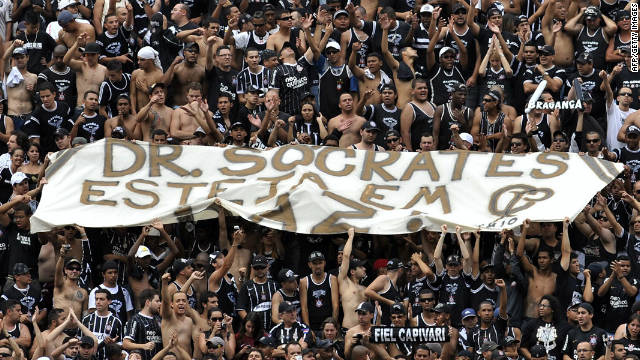Feed: CNN.com - WORLD
Posted on: Monday, December 05, 2011 10:58 AM
Author: CNN.com - WORLD
Subject: Brazil mourns football legend Socrates
Brazilians are mourning the death of one its most iconic soccer players and political activists, Socrates, who died Sunday of septic shock due to an intestinal infection, Brazil's official news agency reported. |
The last days of Socrates: Brazil mourns a football legend

- The football great died Sunday at the age of 57
- He captained the 1982 Brazilian side, regarded as the best team to never win the World Cup
- Socrates fought for democracy during Brazil's military dictatorship
- He recently spoke out about racism in soccer
(CNN) -- Brazilians are mourning the death of legendary soccer player and political activist Socrates, who died Sunday of septic shock due to an intestinal infection.
Socrates Brasileiro Sampaio de Souza Vieira de Oliveira, 57, was buried in his hometown of Ribeirao Preto, Sao Paulo, according to Brazil's official Agencia Brasil.
Socrates had suffered bouts of gastrointestinal bleeding caused by cirrhosis of the liver. He had admitted to addictions to alcohol and cigarettes, Agencia Brasil said.
"It was during his third hospitalization that he confronted his addiction to alcohol and cigarettes, adding that he had 'won' another chance to recover from his complications," the agency reported.
A qualified doctor, renowned intellectual and an outspoken, pro-democracy fighter during Brazil's brutal military dictatorship, Socrates had defied many stereotypes.
The man known as "Doctor Socrates," "Golden Feet" and "Big Skinny" is considered by the international football organization FIFA as one of the 100 greatest players of all time. News of his death was broadcast worldwide, an indication of his fame as one of the world's greatest players.
Despite not turning professional until he was 24, the soccer legend starred for Brazil between 1979 and 1986, playing in two World Cup finals tournaments in the process.
Brazilian legend Socrates dies aged 57
However, Socrates will always be associated with the 1982 Brazilian side, which is widely regarding as the greatest team to never win the World Cup.
Socrates captained the 1982 side in Spain and was widely expected to lift the World Cup trophy. But his team lost 3-2 to Italy in the second phase in one of football's most iconic matches.
The Sao Paulo-based Corinthians Football Club, one of Brazil's heavyweight teams, was a launching pad where Socrates made his name. He became an international legend, scoring more than 300 goals.
Brazil ex-President Luiz Inacio Lula da Silva
During the last game of the "Brasileirao," Brazil's national soccer tournament, the Corinthians beat rival Palmeiras on Sunday.
Fans held a minute of silence, holding up their left fists up high -- one of Socrates' most emblematic gestures after a triumphal match.
Juca Kfouri, one of Brazil's most popular soccer columnists who knew Socrates well, said in his blog for Folha de Sao Paulo newspaper that Socrates had genius in his heels.
In a hospital interview earlier this year, Socrates told Kfouri of his love for Cuba's Fidel Castro and, tragically, his love for alcohol, which became his Achilles heel.
"I am not going to change," Socrates told Kfouri. "I am just going to get rid of alcohol. I've already done that."
"He always had an absurd ability to consume alcohol, to drink and drink and not get drunk," Kfouri said after speaking with Socrates, who at the time had a catheter in his liver.
In an official statement, President Dilma Rousseff lamented the loss of one of Brazil's "most beloved sons" and a "football genius."
Rousseff and former President Luiz Inacio Lula da Silva recalled the athlete's unusual role as a political activist.
During the military dictatorship, Socrates infuriated authorities by wearing an "I want to vote" banner.
"Lula," as the former president is known, and Socrates were friends and collaborators in the 1980s pro-democracy movement known a "Diretas Ja." Socrates, a rare picture of a politicized athlete, marched with trade unionists, artists and athletes to defy the military junta ruling Brazil with an iron fist, persecuting, jailing and often torturing many political dissidents.
Socrates, unlike some of the more apolitical legends of the time, used his status to send a message to the world about what was happening back home.
"Dr. Socrates was a 'crack' in the football field and a great friend," Lula said. "He was an example of citizenship, intelligence and political consciousness, in addition to his immense talent as a football professional."
Most recently, Socrates became a columnist for CartaCapital, a left-leaning news magazine where he wrote eloquently against racism in football, politics and his new passion, the environment. He dissected the issues with the precision of a doctor and the determination of a pro.
Socrates understood that soccer was a way to communicate to Brazilians on important issues.
In one of his final columns, titled "Some Dream Others Don't," Socrates took on Pele for not speaking out against racism in world football.
"Nothing is more endemic (in addition to corruption) than (racism) among those in football management," he wrote amid recent controversy involving FIFA President Sepp Blatter and racist comments in soccer.
"Certainly all negroes in the planet felt attacked except for one: Pele," Socrates wrote. "One thing we know for sure: Pele has never had a dream."
In soccer-crazed Brazil, adoring fans crowded the cemetery where Socrates was buried. Mourners sang the anthem of the Corinthians team in his memory.
Loading weather data ...












No comments:
Post a Comment